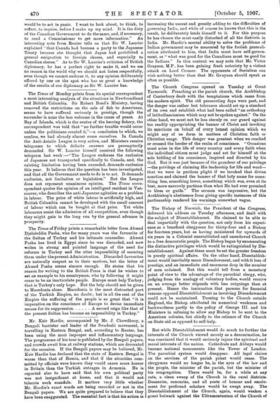The Bishop of Norwich, the President of the Congress, delivered
his address on Tuesday afternoon, and dealt with the subject of Disestablishment. He claimed to be able to deal impartially with the question, not only from his experi. ence as a beneficed clergymen for thirty-four and a Bishop for fourteen years, but as having ministered for upwards of six years in a Colonial unestablished and unendowed Church to a free democratic people. The Bishop began by enumerating the distinctive privileges which would be extinguished by Dis. establishment. Against these must be set the greater freedom in purely spiritual affairs. On the other hand, Disestablish.' meat would inevitably mean Disendowment, and with it loss of prestige, and an immediate and enormous drop in the number of men ordained. But this would tell from a monetary point of view to the advantage of the parochial clergy, who judging from the analogy of voluntary bodies, would receive on an average better stipends with less outgoings than at present. Hence the insinuation that parsons for financial reasons opposed Disestablishment as involving Disendowment could not be maintained. Turning to the Church outside England, the Bishop attributed its numerical weakness and backwardness partly to the policy of George III. and his Ministers in refusing to allow any Bishop to be sent to the American colonies, but chiefly to the reliance of the Church on State aid as opposed to self-help.






























































 Previous page
Previous page